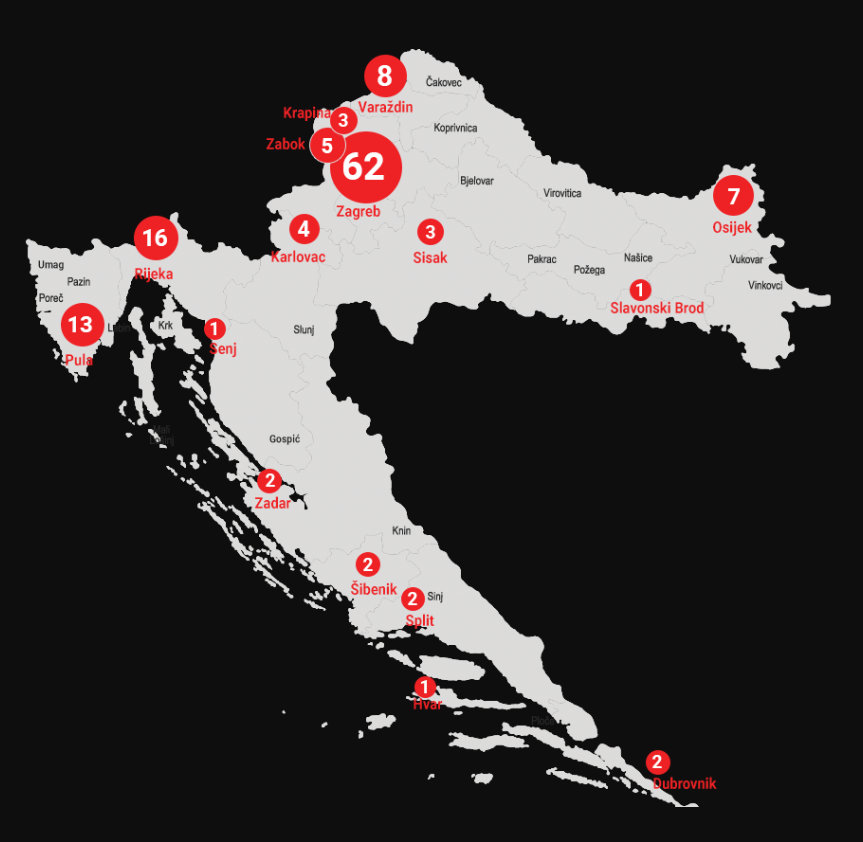Croatia Travel Update March 21, 2020: Flights, Ferries, Borders, Buses, Trains
March 23, 2020 Croatia Travel Update
March 21, 2020 - As the coronavirus dominates, a Croatia travel update on flights, ferries, trains, buses, borders and self-isolation. Some big changes announced today.
Things are changing very quickly as the coronavirus crisis escalates in Europe. A Croatia travel update on what is - and is not - open or running.
Croatia Travel Update: Are the borders of Croatia open?
This is the latest official information from HAK on the situation at the borders of Croatia. For the latest information (in English), check out the HAK website.
At the following border crossings transit freight traffic is allowed:
- at Bregana and Macelj (with Slovenia);
- at Goričan and Duboševica (with Hungary);
- at Nova Sela, Stara Gradiška and Slavonski Šamac (with Bosnia and Herzegovina);
- at Bajakovo (with Serbia).
Transit passengers information, if travelling through Republic of Croatia:
- use motorways only;
- use the following rest areas only: Novska jug, Novska sjever, Kozjak jug, Prokljan sjever, Draganić sjever, Draganić jug, Bačva and Ravna Gora;
- during breaks keep distance between You and other people;
- obey the rules of Civil protection or police officers.
At all border crossings with Croatia inbound traffic is allowed only to Croatian citizens (14-day isolation mandatory) as well as for some special groups of people, such as medical personnel, scientists, eldercare personnel, cross-border workers, freight traffic, diplomats, police officers, civil protection teams, international organizations members, militaries and transit passengers.
At the border crossings with Hungary, Serbia and Montenegro traffic is suspended for all vehicles, except for the citizens of these countries as well as for freight vehicles.
At Bogojevo (Erdut) border crossing all passenger traffic is closed.
At Požane border crossing traffic is suspended due to technical difficulties.
- at Goričan border crossing, detour: Goričan junction-ŽC2026-DC3;
- at Dvor and Vitaljina border crossings - open only to passenger traffic;
- at Gunja border crossing - there is a traffic ban on freight vehicles and buses.
Due to traffic bans on freight vehicles in Slovenia long delays should be expected in freight traffic at Bregana/Obrežje and Macelj/Gruškovje border crossings starting 1 June.
Croatia Travel Update: Are the ferries in Croatia running normally?
Morski.hr reports the latest: Public transportation of passengers, cargo and vehicles to the islands and the Peljesac peninsula is restricted. It is prohibited to maintain all regular high-speed lines in maritime traffic during the coronavirus pandemic in Croatia, except in the case of emergency interventions with the approval of the Croatian Civil Protection Headquarters.
All shipping lines are prohibited except the following national shipping lines:
310 Mali Losinj - (Unije) - Srakane Vele - Susak) and vice versa
311 Ilovik - Mrtvaška and vice versa
405 Rava - (Mala Rava - Veli Iž - Mali Iž) - Zadar and vice versa
415 Vrgada - Pakoštane - (Biograd) and vice versa
501 Krpanj - Brodarica
505 (Vodice - Prvić Šepurine - Prvić Luka - Zlarin) - Šibenik and vice versa
612 Komiža - Biševo and vice versa
807 Suđurađ - Lopud - Koločep - Dubrovnik
All passenger and freight transport to the islands, except for the following categories, is prohibited on national ferry lines and national shipping lines:
- Croatian and foreign nationals residing or permanently residing on the islands or the Peljesac peninsula;
- Vehicles of natural persons and leased vehicles of those residing on the island, registered in the competent administrative body in the Republic of Croatia;
- Employees of public health services and employees of other public services (police, firefighters, armed forces, port authority, post office, utilities) and their official vehicles;
- Employees of shops exempted from the application of the Decision of the Civil Protection Headquarters, and their official vehicles when carrying out regular transport to the island, and delivery services and their vehicles;
- Legal entities carrying out necessary emergency repairs on the island and their official vehicles when carrying out interventions
County Civil Protection Headquarters shall ensure that the measures provided for in this Decision are implemented and monitored.
This is the latest update from HAK:
807 Dubrovnik-Koločep-Lopud-Suđurađ ship does not operate from 2pm till 4.30pm.
Split-Ancona international line does not operate till 1 April, Dubrovnik-Bari till 19 April 2020.
Other ferries operate regularly.
Till 1 June 2020 401 Zadar (Gaženica)-Ist-Olib-Silba-Premuda-Mali Lošinj ferry does not embark at Silba port due to roadworks.
As reported earlier on TCN, Jadrolinija is now requesting that passengers make their ticket purchases online or via their app.
You can check the latest from Jadrolinija on their website.
BUT PLEASE NOTE: Prefect Blazenko Boban briefed the public on the new maritime traffic rules at a press conference at the Split-Dalmatia County Civil Protection Headquarters.
“The National Headquarters will decide if fast lines will no longer operate from today. As far as ferry lines to our islands are concerned, they will only operate to transport goods. As for travelers, only those who reside on these islands will be able to travel,” reported Boban.
Boban is in charge of Split-Dalmatia County. My assumption is that this a nationwide decision, or soon will be if not, but it certainly covers Split-Dalmatia - Hvar, Solta, Brac and Vis.
Croatia Travel Update: What is the situation with train travel in Croatia?
The latest HAK update on the railway is here:
But please be aware that at this morning's press conference, it was announced that there would be a suspension of all bus and train connections between cities.
Croatia Travel Update: What is the situation with flights to Croatia?
The closing of the EU external borders took effect a couple of days ago, a measure that will last for 30 days. As such, all international flights outside EU borders have now been cancelled. There are still flights to Zagreb within EU borders, and so there is not a total flight ban, as ExYuAviation noted a few days ago:
The EU travel will only partially affect Croatia. Under the plan, only visitors from non-EU states will not be allowed to enter the region unless they are long-term residents of the EU, family members of EU nationals, diplomats, cross-border commuters, or essential workers like doctors, nurses, and researchers. The majority of Croatia Airlines’ network is concentrated within the EU, however, plummeting demand and various national restrictions will see the carrier cancel at least nine return flights today, among which are services to cities outside of the block such as Sarajevo and Skopje. Furthermore, flights from Zagreb to Copenhagen, Vienna and Munich have also been cancelled so far today. Despite the new circumstances, Aeroflot, Turkish Airlines and Qatar Airways will operate their flights to the Croatian capital today.
HOWEVER, checking the Zagreb airport departures page today, there are several non-EU flights which appeared to depart - Moscow, Zurich and Istanbul. Here is the Zagreb Airport departures page for the latest info. Contact your airline for the latest news regarding your flight.
Croatia Airlines also have a dedicated information page on which of their flights are going, as well as flight cancellations.
Internal flights within Croatia remain available, as do some to other EU countries. Dubrovnik Airport is closed, however, due to a coronavirus infection. You can see which internal flights are available from Split here - all international flights to the coast have stopped.
We have had a LOT of emails asking what will happen with flight cancellations, and will things be ok in May, June and beyond. Obviously, we have no idea how things will develop. With the 30-day international ban, most flights are already cancelled. We hope the situation will improve, but recommend you check with your individual airline, who will be better informed than us. If there are any major announcements, we will publish them on TCN. Please do not contact us with individual queries about your flight, as we have limited resources currently and are unable to help more than this update.
Croatia Travel Update: Are buses running in Croatia?
According to this morning's press conference, all bus routes between towns are being suspended.
Croatia Travel Update: What are the self-isolation rules for people arriving, who do they apply to, and what is the procedure?
There has been a lot of confusion about the mandatory 14-day self-isolation requirements, what they entail and how they are enforced, as well as who they apply to. I am very grateful to Lauren Simmonds for this excellent overview, having contacted and worked through various sources of conflicting information. Check out Lauren's guide to self-isolation in Croatia here.
The Croatian Government has launched a new information website to coordinate all information about coronavirus in Croatia, called Koronavirus.hr. This includes a page (in Croatian - Google Translate is your friend) called Going on a Trip?
If you have any reliable information to improve the resource above, please contact me on This email address is being protected from spambots. You need JavaScript enabled to view it. and I will update if relevant.
For the latest on the coronavirus crisis in Croatia, follow the dedicated TCN section.
Stay safe!
Croatian Economy to Feel Fallout from Coronavirus Crisis Next Two Years
ZAGREB, March 20, 2020 - Director-general of the Croatian Employers' Association (HUP) Davor Majetić said on Friday that the economy would feel the consequences of the novel coronavirus for the next 1.5 to 2 years and perhaps even longer, adding that he expects the public sector to show solidarity with the private sector.
Commenting on the government's 63-measure rescue package, Majetić said that defining the criteria to hand out HRK 3,250 per employee marks the start of the first and most important measure that the government has adopted for now to bail out the economy.
That measure is exceptionally important for micro, small and medium-sized businesses and for large companies too that are having problems due to the coronavirus, Majetić believes.
"The measures will begin to be implemented as of Monday already and after that we hope that money will be paid into the accounts of all those employers experiencing problems with paying March wages because of the virus," he said.
Majetić added that it would no end with just that measure because it was certain that that would not be enough for all the challenges facing the economy.
"We are continuing with talks with the government primarily regarding the implementation of the remaining 62 measures which we expect to be very simple with smooth criteria whereby the speed of the implementation of each of those measures has to be important," he underscored.
More coronavirus news can be found in the Lifestyle section.
Škoro Submits Declaration of Assets
ZAGREB, March 20, 2020 - The leader of the Homeland Movement party, Miroslav Škoro, released his declaration of assets on the party's website on Friday, but did not state its value, saying that his property was not for sale and that estimating its market value was the job for an appraiser.
Škoro said that as a businessman, artist and founder of a political movement he was not legally or in any other way obliged to release his declaration of assets, but that he was doing so to set an example to all those who want to transparently serve the people.
He divided his declaration into 21 items which include two houses, a 400 square metre house in Zagreb, owned by his wife Kim Ann Škoro, and a 455 square metre house in the coastal town of Tribunj, half of which is owned by Škoro.
He also owns land in Donja Drenova, and vineyards, a forest and a meadow in Mitrovac.
His wife owns three farm plots in Resnik and has a share in the plot in Zagreb's Zajčeva Street.
Skoro and his wife own Hrvatski Telecom shares - 276 each, and two burial plots. They co-own the Campus d.o.o. company and hold shares in the MB Kvadrat d.o.o. company and the Monperin d.d. company.
Škoro's gross annual royalties amount to approximately 700,000 kuna. He claims he pays his own contributions.
More news about Miroslav Škoro can be found in the Politics section.
Coronavirus in Croatia Morning Press Conference Update March 21, 2020
March 21, 2020 - The latest news about the spread of coronavirus in Croatia from the morning press conference.
10:00 ADDITION TO THE PRESS CONFERENCE information below - there are now 168 cases, and ferries will only be available for islanders and to transport goods and supplies in Split-Dalmatia County at least (this from an ongoing press conference in Split). More in our daily update.
Yesterday's rolling update of the coronavirus in Croatia was fully updated late last night. You can see the full day's events here.
There are two recommended maps to follow. The first is the official government one on the Koronavirus.hr website.
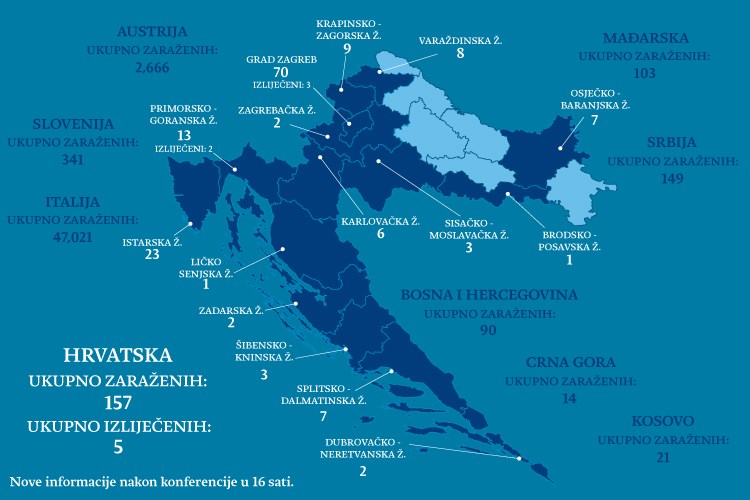
This is broken down by country in terms of numbers, and Health Minister Vili Beros has announced 29 new cases overnight, bringing the number to 157, of which 5 have recovered. The locations of the new cases will be made available later today.
The other is by Index, which breaks everything down by destination. Of the two, in general, I find Index is updated quicker. Index reports one death, while the government site reports none. The reason for this difference is the death of a restaurant owner in Istria which was announced as coronavirus, is still being confirmed by official sources before going on the official website. It has been counted in the global numbers by respected sources.
At the press conference, Beros said he was no longer requesting people to abide by the instructions, but requiring them to do so.
The Spaladium Arena in Split is being prepared for the third phase.
A Croatian Airlines flight from Dubai has arrived, carrying masks and equipment from the UAE Government, for which Beros expressed his thanks. After Beros, Interior Minister Bozinovic spoke
"The main problem is adherence to all the decisions made by the HQ. They were intended so that everyone adheres to them, but the facts show otherwise. There are minorities who are a danger to themselves and others. We will have to take more rigorous actions. The Croatian police will ensure the measures are implemented and will react every time that implementation is not adhered to. It is all based on one premise: people stay home. Do not leave the house. Except for those who have to go to work.
All employers and workers must be aware that they must organize themselves to the fullest extent possible. I saw people go two by two this morning. That's not ok. Break this habit or the police will punish you
The Croatian police will be touring all public places throughout Croatia. All our streets and where they see that someone is not adhering to the measures, they will take action.
In fact, in some ways we are closing down all public areas. We cannot physically close them, but we will not allow any gathering. We are shutting down all intercity lines for trains and buses.
What is clear is that decisions will be more rigorous, even tougher.
Alemka Markotic then spoke:
"It's time for us to realize that we are not watching a movie but living in reality. This morning I saw senior citizens walking around again. I hear groups of people who are not working sitting on the terrace. If we want a corona party we will have it. And I think to myself - What does a corona party look like?
We are receiving an increasing number of people at the clinic. The reasons are due to everything we were warning about, so it's all because of irresponsibility.
There will only be more severe cases in the hospital. People will have to find ways to isolate themselves inside their homes. If they can't, we'll find a solution.
If it turns out you were in contact with someone and you are in the hospital, they will be taken care of at that same hospital initially.
Who should come to the Infectious Unit? All those with the knowledge that they have been in contact, who have a high fever, and who are coughing and feeling tightness in their chest. There were a lot of people at the Infectious Unit tonight with some mild symptoms. Do not come there if you have only mild symptoms.
Yesterday, over 100 people from self-isolation came to the pharmacies. This has now come to an end, but they have already endangered many people. Anyone who breaks isolation will be sanctioned. The punishment is not important, but you will have others on your conscience."
Krunoslav Capak spoke next:
"The time has come to stop everything. We have had 29 cases from yesterday to the present, which is 1/4 of all cases so far. Our upward curve is increasingly going up. Therefore, we need to introduce stricter measures. We have 90 people in quarantine, 54 Croatian nationals, the rest are foreigners, we have 45 truck drivers who are under a special regime."
"If it turns out that people are coming together and that social distance cannot be maintained, we will close them at once."
"People stay home if you have to go out short and return home immediately. If you violate the measures, the Croatian police are ready to do their job and protect people."
For the latest update from the official government website for COVID-19 in Croatia, click here (Croatian language only, Google Translate is your friend).
We will have more in our comprehensive daily update later. For the latest news on COVID-19 in Croatia, follow the dedicated TCN section.
Travel Industry: Keep Communicating and Visibility
March 21, 2020 - Running a business in the travel industry in these chaotic times? Some thoughts from Zoran Pejovic, CEO of Paradox Hospitality in Split.
Stay visible! Communicate! Be mindful!
Coronavirus disease, the virus pandemic and the symbiotic fear pandemic, is an unprecedented global event that is about to bring the developed world to a halt. Nothing similar has ever happened in our lifetime. Nothing will ever be the same. Things will get back to normal one day, but it will be a new normal. Embrace this information. Become aware of the new and developing context. Be mindful of your position, but also of the positions of others. Everybody, literally everybody you know is facing uncertainties about their health, business and job prospects, and the future in general. Don’t deny it, don’t overreact, embrace it, understand it. Read the official statements, read scientific journals, read research papers, practice social distancing and social media distancing, because both can be deadly these days. Afterwards, take time to think.
If you are a hotel or a travel agency, tour operator, travel designer, destination management company or a restaurant, you are facing an insurmountable challenge. Closed borders, cancelled flights and zero business. Take time to think.
Very few tools are at your disposal now, but you are not without a voice. One of the most important questions right now is how to communicate your message to the world?
You want to keep your visibility, and that is important and understandable. I think you should make yourself visible but be very smart about it. I think it is the right thing to continue using the social media to a certain extent, but use it to promote the importance of mental health, promote life in small communities if you are in one of those, tell the stories of local heroes and support the efforts of people who are putting everything they know into solving this crisis. Or else tell a dream. Tell a heartfelt story.
Perhaps you might feel an urge or get a directive to address the world with an official statement. Considering how the situation is changing by the hour I am not very supportive of these type of communication tools. Instead, pick up the phone and call your most important stakeholders. Talk to people. It feels great. You might learn something new; you might tell them something that they did not know. Anyway, it is way more personal and valuable. Call them again.
Then again, I am being inundated daily with messages from CEOs and PR specialists from companies from all over the world showing how much they care about me, how much they understand my predicament, how much they care about their employees and how we are all going to bounce back one fine day as if nothing has ever happened, or how are we going to be stronger than ever, just this time with dolphins swimming up the Venice canals. Even in these situations, most of the companies are falling back on the corporate language. So, please, if you are one of those that I listed above, a small hotel, or a large hotel, you are in the travel or tourism industry, please drop the corporate language. If there ever was the time to not copy and paste and regurgitate the same messages just for the sake of sending them, it is now. It is way better to send nothing right now, than to send half a page of corporate cacophony that says something but nothing at the same time. Nobody really reads that. Why send it then?
However, if you are ready to send something, keep it short, honest and to the point. There is no recipe on what to say really. Perhaps you can tell people that you are hurting. You can ask for help. You can offer help. Whatever you say, make it your own. You built that business, you have been running it for years, guests trusted you, your partners trusted you. Trust them now with your openness and sincerity. Honesty is the best policy!
If you are sending mass emails to partners, guests or others please do not add your owners or CEOs headshots to them. Also, do not try to make it funny, or add to the panic. Most importantly, do not spread misinformation and fake news.
Afterwards, take time to think! And then clear your mind!
You can connect with Zoran Pejovic via LinkedIn.
Coronavirus in Croatia: Will Ultra Europe Go On in Split?
March 21, 2020 - More than 40,000 daily visitors and a total of 120,000 from 143 countries danced for three full days last July at the Ultra Europe music festival held at Park Mladezi in Split.
Unofficially, Slobodna Dalmacija reports that the organizers are planning this year's edition despite the global coronavirus pandemic.
The most popular electronic music festival is scheduled for July 10, 11 and 12. Still, the question arises as to how long this pandemic will last, given the fact that thousands of festival-goers from all over the world are in Split during this time.
There are innumerable questions, and there are few answers to them at the moment.
Some will agree that maintaining Ultra Europe will help the citizens of Split to at least somewhat get out of the unenviable financial situation caused by the pandemic, and although the festival itself is just four months away, in this case, they should be guided by one rule - better prevented than treated.
“At this point, it is difficult to predict how long all this will take and make any forecasts. As we can see, in China it is going down, in Italy it is booming, with us, it is just beginning.
Of course, we would all be happy to have our lives back to normal. If Ultra is still held, visitors take the risk themselves by coming,” said Željka Karin, director of the Public Health Teaching Institute of Split-Dalmatia County.
What if the virus is eradicated by July and Ultra Europe goes on, does it still pose a risk to the citizens of Split?
Slobodna Dalmacija also sent an inquiry to the City of Split, where the City said it is currently dealing with more important things, and they relate to a series of measures aimed at alleviating the effects of the coronavirus pandemic for citizens and the economy.
Earlier this month, Ultra organizers were forced to decide to cancel the festival in Abu Dhabi (March 5-6), as well as the one in Miami (March 20, 21, and 22), for the first time since the world's craziest party started in 1999.
All those who have already purchased tickets for the Split edition could have problems because, after the cancellation of Miami and Abu Dhabi, the decision was made not to refund the money spent, but any holder of an unused ticket will be entitled to attend Ultra in 2021 or 2022.
This has caused an uproar from festival-goers, and a series of petitions can be found on the internet seeking a refund for the tickets purchased.
Organizers have not yet posted anything on their official site, and have not even updated their status on Facebook since March 6.
The seventh edition of Ultra in Split registered its millionth guest, and because of record ticket sales, it was the most visited year since it was held in Croatia. The new space also opened up new possibilities in the form of the theatrical main stage, the largest ever set in the region, and with its production and size, exceeded all expectations so far.
On the impressive LED screen, visualizations constantly swirled, all complemented by numerous special effects. From the visual show to the perfect sound and infectious beats, everything was flawlessly executed. The world's biggest electronic music names such as Swedish House Mafia, Carl Cox, David Guetta, Afrojack, Above & Beyond, Adam Beyer, Armin van Buuren, The Chainsmokers, Maceo Plex alternated on the stages.
As things stand now, even though the organizers are still doing everything according to plan, it is certainly possible that Ultra Europe will not go on in Split this summer.
To read more about lifestyle in Croatia, follow TCN's dedicated page.
Vrgorac Promotes Local OPGs by Opening Digital Market
March 21, 2020 - The OPGs in the agricultural area of Vrgorac will now be promoted on a digital platform for buyers all around Croatia.
Dalmacija Danas writes that the town of Vrgorac is an agricultural region with over 450 active farms. This area produces tons of strawberries, peaches, apples, plums, table grapes, various fruits and vegetables, and the region is famous for its honey and wine production. Vrgorac now wants to make information available on local OPGs.
“We will maximize our digital green market by agricultural season. Our application can bring domestic products closer to everyone in Croatia.
The "Buy Local - OPG Fruits and Vegetables" app is the result of work on the Think Global, Buy Local project, which we designed within the City and our Entrepreneurial Center to encourage the sale of local producers' agricultural products on the national market.
As part of the conference Smart Cities - Cities of the Future 2018, the City of Vrgorac was awarded the Smart City Award 2018 in the category - Smart Digitization for the android app Buy Local - OPG Fruits and Vegetables.
First, we created a website with a database of family farms, their products and the quantities available, and then an android application that easily connects producers and end-users in just three steps. This creates a direct connection between the buyer and the farmer.
The base will be filled by the agricultural season. I invite all farmers from the Vrgorac area to enroll and submit information on their quantities. This will enable every Croatian citizen who wants to buy local products so that they can reach you.
The contact person for information will be employee Goran Franić, mobile number: +385 99 3558 606,” said the Mayor of Vrgorac, Ante Pranić.
The Vrgorac digital market is available on the Buy Local website here.
To read more about Inland Dalmatia, follow TCN’s dedicated page.
Croatia Welcomes Spring with Sunny Skies and Warm Weather, But Will It Last?
March 21, 2020 - Croatia welcomed the spring season with sunny skies and short sleeves, but will it last? A long-term weather forecast.
RTL meteorologist Dunja Mazzocco Drvar, however, announces that this taste of summer will only last two days, reports T.portal.
March will continue with some changes and chills, which we will experience in the next few days. Temperature drops and sudden changes in weather are typical for this time of year, and especially in April. But what kind of spring awaits us?
According to current calculations, it can be said with more than 80 percent certainty that the next quarterly period, April to June, will bring warmer weather than average. With the same probability, it can be said that there will be less precipitation at that time than is usual for this time of year, says Ana Bago Tomac, a meteorologist at Dnevnik Nova TV and Zagreb Airport.
Of course, we can expect precipitation, especially in May, the most unstable month of the year. Still, on average, the coming period, until summer, will be dry and warmer than the long-term average, says Bago Tomac.
This is a trend that continues year after year. Last year was the hottest year, and the effects of global warming will certainly be felt this year.
We had no real winter this year, and temperatures will continue to rise more than average in the spring, AccuWeather predicts. However, this does not mean that strong storms cannot be expected between March and May, alternating with droughts. Admittedly, storms will move north of the continent and will be of concern mainly to Ireland and the UK.
While temperatures above average are forecast across Europe, the most frequent and longest periods of heat will be felt in the Iberian Peninsula and Germany and the southern United Kingdom.
More warmth also means an earlier start to the allergy season that will come with flowering plants and increasing pollen in the air, warned AccuWeather meteorologist Tyler Roys. At the same time, the benefits of warm and mostly dry weather could be of use to farmers as they will be able to plant faster than usual.
This spring heat could easily turn into unpleasant heat well before the calendar and meteorological start of summer. "I expect it to heat up in parts of Portugal and Spain as early as May in the middle of May," Roys predicts. "On land, temperatures could easily go above 30 degrees Celsius."
Moreover, forecast data show that temperatures could rise as high as 38 degrees in late May and early June, and up to 27 in London.
"High temperatures, above 30 degrees Celsius, can be expected in the second half of May from Paris to Berlin," announced AccuWeather meteorologist Alan Reppert.
At the same time, meteorologists warn, despite the warm weather, or because of that, humid air and spring storms can be expected across western and central Europe. The greatest danger is threatening residents from France, through Belgium and the Netherlands, to Germany and northwest Poland.
Devastating winds, hailstorms and torrential showers could cause concern for many residents of endangered areas, and tornadoes could be expected. All of this will cause traffic jams and power outages, AccuWeather warns. In particular, the area between Paris and Berlin will be endangered during April and May.
The positive side of occasional storms will be rainfall that will soak the soil and prevent the riverbeds from drying out. Thunderstorms, on the other hand, can damage crops, according to an AccuWeather report.
Meteo France also predicts temperatures higher than average for the time of year: temperatures in the British Isles should be 0.5 to one degree Celsius above average, while in most parts of northern and eastern Europe, temperatures are expected to be up to two degrees higher than usual.
Northern Europe will be slightly wetter than average, especially Norway and central parts of Scandinavia, while in western and southwestern Europe, the coming period should again be drier than average.
March to May will be marked by high pressure over much of northern and western Europe, again indicating a relatively dry and anticyclonic spring, while low pressure is expected at north latitudes, French meteorologists forecast, and with the arrival of summer in western Europe, the cooling that should come with the winds blowing from the Atlantic.
German DWD also predicts warmer weather than average, in southwestern Europe and by two degrees Celsius. Rainfall is predicted to be less in the west, southwest and southern parts of the continent, while the far northern Europe should be wetter than average.
And in Croatia, it will generally be drier and warmer, with expected showers, especially in May.
To read more about lifestyle in Croatia, follow TCN's dedicated page.
In Medias Res: The Voice of the Entrepreneur (Glas Poduzetnika)
Or: How to save as many companies and employees. Meet Glas Poduzetnika (Voice of the Entrepreneur), a new private-sector initiative in Croatia.
March 21, 2020 - In the second half of March 2020, the coronavirus outbreak and its economic repercussions are on the rise and going truly global. From the health perspective, Croatia is comparatively well, with currently just 130 reported infected patients. On the other hand, chaos and fear, flavoured with uncertainty are also on the rise in business circles and between employers and employees. In the last few days, hundreds of employees have already been fired, and companies are preparing for the worst-case scenario, of losing 80 or 90% of their revenues, and trying to create some crisis management plans. And we are only at the beginning. The real problem is that nobody can say with certainty how long this crisis will last, and especially how long will we suffer the consequences. Will It be up to 2 months, and there is still some time for the tourist season, or it will be 6 or more months just to get rid of COVID-19? Some projections that are considered moderate, are mentioning 18 months of “economic contraction”. For Croatia, as a country significantly depending on tourism, the situation is far from good.
So, what happened in the last day or two? After the government published their extensive list of 63 measures, many entrepreneurial voices started to respond and to criticise the list. It seems that in comparison to other countries, they are not fast enough, clear enough, or efficient enough. They seem like politicians did something to save their jobs and explain their purpose, and not really to make things better for the economy.
A new initiative has been created by a group of 20 – 30 entrepreneurs (Hrvoje Bujas, Drazen Orescanin, Berislav Marszalek, Kristina Ercegovic, Ivana Matic, Bruno Samardzic etc.) and it got a name – The Voice of the Entrepreneur (Glas Poduzetnika). In less than 24 hours it gathered a few thousand entrepreneurs on Facebook, and is closing now on 10 000 members, a number that makes it a significant social voice. The number of stories shared in the group was amazing and at the same time depressing. There is really no time to waste and no sense to underestimate the situation and its consequences.

The initiative was spontaneously created also as a response to the perception that the Croatian Government still doesn’t have the awareness that the private sector is feeding the public sector, and that if it goes down, country institutions will also not be able to function. In the call for solidarity, the Government is still not ready to reduce the working privileges of the public sector employees, their traditional voters, but to leave the burden of the crisis to the private sector alone. If some measures are just postponing some payments, and not cancelling them entirely for this period of time, it will be almost completely useless, and miss the intended positive impact on the economy.
On the other side, it is still visible that entrepreneurs are victims of the strong stereotypes about them. They are, in some parts of the society, still perceived as disproportionally rich, selfish and self-centered people who are just hoarding the money and don’t want to show solidarity with their workers and help them in this obvious time of need.
To fact check those comments, 2 surveys were organized which received hundreds of responses in a few hours. I think it will give a much clearer picture to the general population about the real situation of the Croatian entrepreneurial community.
The first question was:
How much cash do you have saved in reserve?
This should give a direct answer to the assumption of big piles of money in the hands of the entrepreneurs. And here are the results in Pie Chart 1.
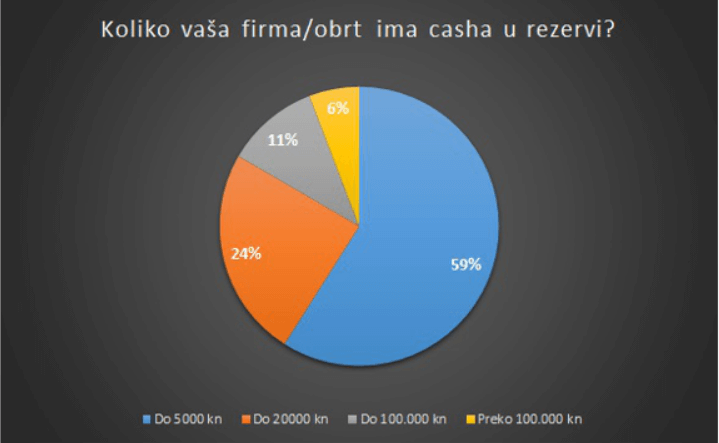
Almost 60% !! of entrepreneurs have financial reserves that are not higher than 5000 kn (some of them stated 1000 kn or even 0). That amount is insignificant for any kind of planning or decisions. The next 24 % has up to 20 000 kn in reserve which makes them able to pay their obligations and salary maybe for this month. The next 11% has up to 100 000 kn, and only 6 % has more than 100 000 kn. And it should be noted that this information is missing the obviously critical facts about the size and fixed costs of the company, which can make savings in millions disappear “overnight”.
The second question was about how much time they can survive AFTER they do some adaptations and cost-cutting? if this situation doesn’t get better significantly. And the answers are very aligned with the results from the first question:
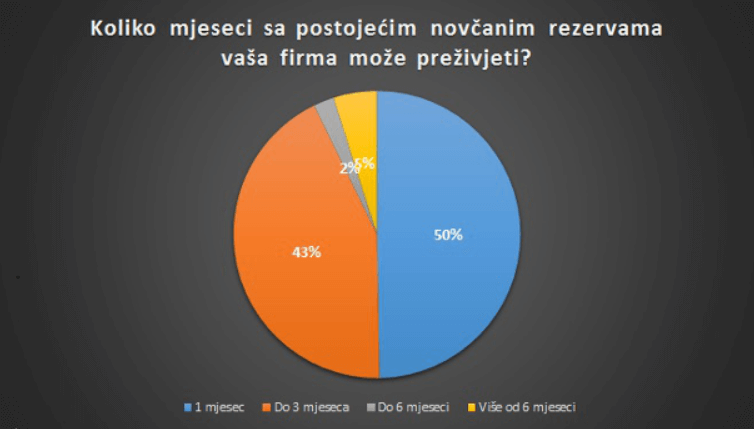
50% of entrepreneurs can survive only ONE month, after that they will just close. The next 43% will be able to survive up to 3 months – so basically the period of time that is predicted as a best and unrealistic case scenario. Only 5% of companies can survive longer than 6 months. Those facts should be seriously considered when making any state-induced measures.
The second interesting piece of the information would be to cross-reference local measures with the measures of other EU countries. And some documents are already being created.
To sum up, as many world leaders stated, this is the worst crisis since World War 2. Decisions made today should be wise and based on facts and with the overview of the whole picture. We will know in a very short period of time if those decisions are good or bad, but the consequences will be felt most probably for years. So let us all unite our experience and skills and make the best of this situation.
And to end with a quote and a song:
The revolution will not be televised, The revolution will be live
Below a draft of the measures proposed by the Voice of the Entrepreneur:
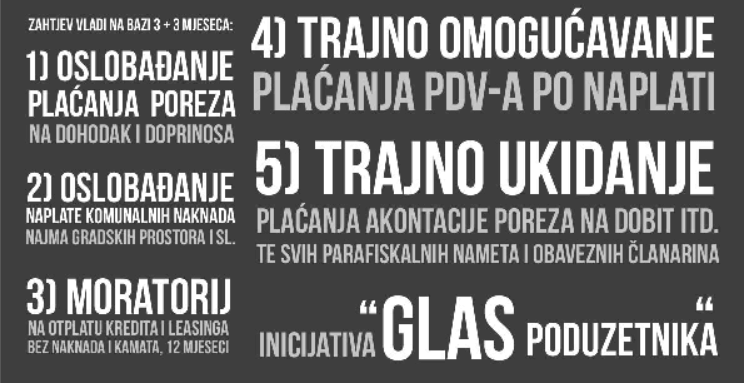
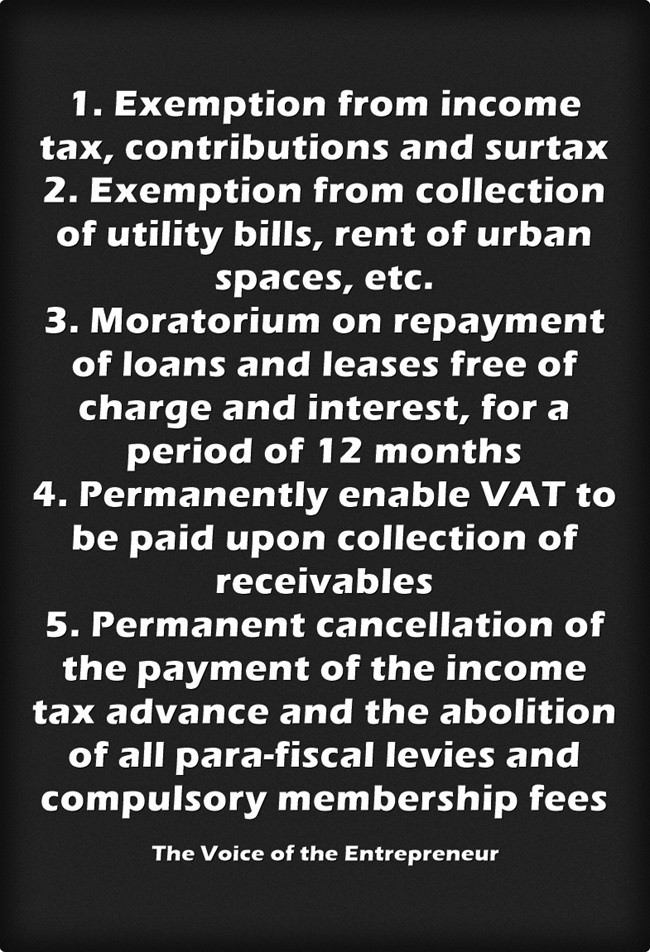
Aco Momcilovic
Member of The Voice of the Entrepreneur Group (Visit the Glas Poduzetnika Facebook page here)
Owner of FutureHR
You can connect with Aco Momcilovic via LinkedIn.
Croatia Travel Update March 20, 2020: Flights, Ferries, Borders, Self-Isolation
MARCH 23, 2020 CROATIA TRAVEL UPDATE
March 20, 2020 - As the coronavirus dominates, a Croatia travel update on flights, ferries, trains, buses, borders and self-isolation.
Things are changing very quickly as the coronavirus crisis escalates in Europe. A Croatia travel update on what is - and is not - open or running.
Croatia Travel Update: Are the borders of Croatia open?
This is the latest official information from HAK on the situation at the borders of Croatia. For the latest information (in English), check out the HAK website.
Transit passengers information, if travelling through Republic of Croatia:
- use motorways only;
- use the following rest areas only: Novska jug, Novska sjever, Kozjak jug, Prokljan sjever, Draganić sjever, Draganić jug, Bačva and Ravna Gora;
- during breaks keep distance between You and other people;
- obey the rules of Civil protection or police officers.
At all border crossings with Croatia inbound traffic is allowed only to Croatian citizens (14-day isolation mandatory) as well as for some special groups of people, such as medical personnel, scientists, eldercare personnel, cross-border workers, freight traffic, diplomats, police officers, civil protection teams, international organizations members, militaries and transit passengers.
At the border crossings with Hungary, Serbia and Montenegro traffic is suspended for all vehicles, except for the citizens of these countries as well as for freight vehicles.
At Bogojevo (Erdut) border crossing all passenger traffic is closed.
Traffic is closed at the following border crossings:
- at Goričan border crossing, detour: Goričan junction-ŽC2026-DC3;
- at Dvor and Vitaljina border crossings - open only to passenger traffic;
- at Gunja border crossing - there is a traffic ban on freight vehicles and buses.
Due to traffic bans on freight vehicles in Slovenia long delays should be expected in freight traffic at Bregana/Obrežje and Macelj/Gruškovje border crossings starting 1 June.
Croatia Travel Update: Are the ferries in Croatia running normally?
Domestic ferries are running as normal. This is the latest update from HAK:
807 Dubrovnik-Koločep-Lopud-Suđurađ ship does not operate from 2pm till 4.30pm.
Split-Ancona international line does not operate till 1 April, Dubrovnik-Bari till 19 April 2020.
Other ferries operate regularly.
Till 1 June 2020 401 Zadar (Gaženica)-Ist-Olib-Silba-Premuda-Mali Lošinj ferry does not embark at Silba port due to roadworks.
As reported earlier on TCN, Jadrolinija is now requesting that passengers make their ticket purchases online or via their app.
You can check the latest from Jadrolinija on their website.
Croatia Travel Update: What is the situation with train travel in Croatia?
The latest HAK update on the railways:
All information about changes in schedule made due to COVID-19 regarding Croatian and international railway traffic you can get here.
Due to repair work passengers are transported by buses so delays are possible on the following sections:
- between Dugo Selo and Križevci railway stations (on the rail state border-Botovo-Dugo Selo)
- between Zaprešić and Zabok railway stations (on the rail Zaprešić-Čakovec)
- between Sunja and Sisak Caprag railway stations (on the rail Zagreb-Sisak-Novska)
- between Ogulin and Moravice railway stations (on the rail Zagreb-Rijeka).
International railway traffic:
Railway traffic is suspended towards Slovenia, Austria, Germany, Switzerland, Serbia and Hungary.
Croatia Travel Update: What is the situation with flights to Croatia?
The closing of the EU external borders took effect today, a measure that will last for 30 days. As such, all international flights outside EU borders have now been cancelled. There are still flights to Zagreb within EU borders, and so there is not a total flight ban, as ExYuAviation noted a few days ago:
The EU travel will only partially affect Croatia. Under the plan, only visitors from non-EU states will not be allowed to enter the region unless they are long-term residents of the EU, family members of EU nationals, diplomats, cross-border commuters, or essential workers like doctors, nurses, and researchers. The majority of Croatia Airlines’ network is concentrated within the EU, however, plummeting demand and various national restrictions will see the carrier cancel at least nine return flights today, among which are services to cities outside of the block such as Sarajevo and Skopje. Furthermore, flights from Zagreb to Copenhagen, Vienna and Munich have also been cancelled so far today. Despite the new circumstances, Aeroflot, Turkish Airlines and Qatar Airways will operate their flights to the Croatian capital today.
HOWEVER, checking the Zagreb airport departures page today, there were two non-EU flights which appeared to depart - Croatia Airlines to Sarajevo, and Qatar Airways to Doha. Here is the Zagreb Airport departures page for the latest info. Contact your airline for the latest news regarding your flight.
Croatia Airlines also have a dedicated information page on which of their flights are going, as well as flight cancellations.
Internal flights within Croatia remain available, as do some to other EU countries. Dubrovnik Airport is closed, however, due to a coronavirus infection. You can see which internal flights are available from Split here - all international flights to the coast have stopped.
We have had a LOT of emails asking what will happen with flight cancellations, and will things be ok in May, June and beyond. Obviously, we have no idea how things will develop. With the 30-day international ban, most flights are already cancelled. We hope the situation will improve, but recommend you check with your individual airline, who will be better informed than us. If there are any major announcements, we will publish them on TCN. Please do not contact us with individual queries about your flight, as we have limited resources currently and are unable to help more than this update.
READER INFO UPDATE (added after publication)
A booking was made today (Friday) for travel starting from Split on Sunday by US citizen to US.
Sunday: Separate domestic leg SPU-ZAG.Monday, from Zagreb: ZAG-BRU-EWR (Newark, NJ). United Airlines.
Croatia Travel Update: Are buses running in Croatia?
Yes they are, but at reduced capacity in many cases. I don't have a good resource for national information (if anyone does, please contact me at This email address is being protected from spambots. You need JavaScript enabled to view it. and I will add). One of the biggest operators, Croatia Bus, stopped all routes temporarily due to COVID-19 (source Zagreb Bus Station Facebook page).

Zagreb Bus Station has published a number to call - 072 500 400 - to check if your bus is running.
In other more localised bus news by TCN, there is free local bus travel in Dubrovnik, and here is a recent update from Split bus station.
Please note that the issue of restricting internal travel has been raised, as part of the strategy to contain the virus, so it could well happy soon that there are few, is any, buses available.
Croatia Travel Update: What are the self-isolation rules for people arriving, who do they apply to, and what is the procedure?
There has been a lot of confusion about the mandatory 14-day self-isolation requirements, what they entail and how they are enforced, as well as who they apply to. I am very grateful to Lauren Simmonds for this excellent overview, having contacted and worked through various sources of conflicting information. Check out Lauren's guide to self-isolation in Croatia here.
The Croatian Government has launched a new information website to coordinate all information about coronavirus in Croatia, called Koronavirus.hr. This includes a page (in Croatian - Google Translate is your friend) called Going on a Trip?
If you have any reliable information to improve the resource above, please contact me on This email address is being protected from spambots. You need JavaScript enabled to view it. and I will update if relevant.
For the latest on the coronavirus crisis in Croatia, follow the dedicated TCN section.
Stay safe!

